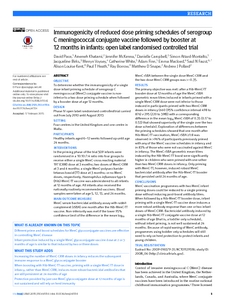Pace, D;
Khatami, A;
McKenna, J;
Campbell, D;
Attard-Montalto, S;
Birks, J;
Voysey, M;
White, C;
Finn, A;
Macloed, E;
et al.
Pace, D; Khatami, A; McKenna, J; Campbell, D; Attard-Montalto, S; Birks, J; Voysey, M; White, C; Finn, A; Macloed, E; Faust, SN; Kent, AL; Heath, PT; Borrow, R; Snape, MD; Pollard, AJ
(2015)
Immunogenicity of reduced dose priming schedules of serogroup C meningococcal conjugate vaccine followed by booster at 12 months in infants: open label randomised controlled trial.
BMJ, 350.
h1554.
ISSN 1756-1833
https://doi.org/10.1136/bmj.h1554
SGUL Authors: Heath, Paul Trafford
![[img]](https://openaccess.sgul.ac.uk/107454/1.hassmallThumbnailVersion/Immunogenicity%20of%20reduced%20dose%20priming%20schedules%20of%20serogroup%20C%20meningococcal%20conjugate%20vaccine%20followed%20by%20booster%20at%2012%20months%20in%20infants%3A%20open%20label%20randomised%20controlled%20trial..pdf)  Preview |
|
["document_typename_cannot open `/data/SGUL/sgul/eprints3/archives/sgul/documents/disk0/00/10/74/54/01/Immunogenicity' (No such file or directory)
cannot open `of' (No such file or directory)
cannot open `reduced' (No such file or directory)
cannot open `dose' (No such file " not defined]
Published Version
Available under License Creative Commons Attribution Non-commercial.
Download (424kB)
| Preview
|
Abstract
OBJECTIVE: To determine whether the immunogenicity of a single dose infant priming schedule of serogroup C meningococcal (MenC) conjugate vaccine is non-inferior to a two dose priming schedule when followed by a booster dose at age 12 months. DESIGN: Phase IV open label randomised controlled trial carried out from July 2010 until August 2013 SETTING: Four centres in the United Kingdom and one centre in Malta. PARTICIPANTS: Healthy infants aged 6-12 weeks followed up until age 24 months. INTERVENTIONS: In the priming phase of the trial 509 infants were randomised in a 10:10:7:4 ratio into four groups to receive either a single MenC-cross reacting material 197 (CRM) dose at 3 months; two doses of MenC-CRM at 3 and 4 months; a single MenC-polysaccharide-tetanus toxoid (TT) dose at 3 months; or no MenC doses, respectively. Haemophilus influenzae type b (Hib)-MenC-TT vaccine was administered to all infants at 12 months of age. All infants also received the nationally routinely recommended vaccines. Blood samples were taken at age 5, 12, 13, and 24 months. MAIN OUTCOME MEASURE: MenC serum bactericidal antibody assay with rabbit complement (rSBA) one month after the Hib-MenC-TT vaccine. Non-inferiority was met if the lower 95% confidence limit of the difference in the mean log10 MenC rSBA between the single dose MenC-CRM and the two dose MenC-CRM groups was >-0.35. RESULTS: The primary objective was met: after a Hib-MenC-TT booster dose at 12 months of age the MenC rSBA geometric mean titres induced in infants primed with a single MenC-CRM dose were not inferior to those induced in participants primed with two MenC-CRM doses in infancy (660 (95% confidence interval 498 to 876) v 295 (220 to 398)) with a corresponding difference in the mean log10 MenC rSBA of 0.35 (0.17 to 0.53) that showed superiority of the single over the two dose schedule). Exploration of differences between the priming schedules showed that one month after Hib-MenC-TT vaccination, MenC rSBA ≥ 1:8 was observed in >96% of participants previously primed with any of the MenC vaccine schedules in infancy and in 83% of those who were not vaccinated against MenC in infancy. The MenC rSBA geometric mean titres induced by the Hib-MenC-TT boost were significantly higher in children who were primed with one rather than two MenC-CRM doses in infancy. Only priming with MenC-TT, however, induced robust MenC bactericidal antibody after the Hib-MenC-TT booster that persisted until 24 months of age. CONCLUSIONS: MenC vaccination programmes with two MenC infant priming doses could be reduced to a single priming dose without reducing post-boost antibody titres. When followed by a Hib-MenC-TT booster dose, infant priming with a single MenC-TT vaccine dose induces a more robust antibody response than one or two infant doses of MenC-CRM. Bactericidal antibody induced by a single Hib-MenC-TT conjugate vaccine dose at 12 months of age (that is, a toddler only schedule), without infant priming, is not well sustained at 24 months. Because of rapid waning of MenC antibody, programmes using toddler only schedules will still need to rely on herd protection to protect infants and young children.Trial registration Eudract No: 2009-016579-31; NCT01129518; study ID: 2008_06 (http://clinicaltrials.gov).
| Item Type: |
Article
|
| Additional Information: |
This is an Open Access article distributed in accordance with the Creative Commons Attribution Non Commercial (CC b
Y-NC 4.0) license, which permits others to distribute, remix, adapt, build upon this work non-commercially, and license their derivative works on different terms, provided the original work is properly cited and the use is non-commercial. See: http://creativecommons.org/licenses/
by-nc/4.0/.
Errata available at: https://doi.org/10.1136/bmj.i2605 |
| Keywords: |
Child, Preschool, Female, Follow-Up Studies, Great Britain, Humans, Immunization Schedule, Immunization, Secondary, Infant, Male, Malta, Meningococcal Vaccines, Models, Statistical, Serum Bactericidal Antibody Assay, Vaccines, Conjugate, Humans, Immunization Schedule, Immunization, Secondary, Models, Statistical, Meningococcal Vaccines, Vaccines, Conjugate, Child, Preschool, Infant, Malta, Serum Bactericidal Antibody Assay, Female, Follow-Up Studies, Male, Great Britain, General & Internal Medicine |
| SGUL Research Institute / Research Centre: |
Academic Structure > Infection and Immunity Research Institute (INII) |
| Journal or Publication Title: |
BMJ |
| ISSN: |
1756-1833 |
| Language: |
eng |
| Publisher License: |
Creative Commons: Attribution-Noncommercial 3.0 |
| Projects: |
| Project ID | Funder | Funder ID |
|---|
| UNSPECIFIED | Wellcome Trust | UNSPECIFIED |
|
| PubMed ID: |
25832102 |
| Web of Science ID: |
WOS:000352439300005 |
| Dates: |
| Date |
Event |
| 2015-04-01 |
Published |
| 2015-02-17 |
Accepted |
|
 |
Go to PubMed abstract |
| URI: |
https://openaccess.sgul.ac.uk/id/eprint/107454 |
| Publisher's version: |
https://doi.org/10.1136/bmj.h1554 |
Statistics
Item downloaded times since 06 Jul 2017.
Actions (login required)
 |
Edit Item |



